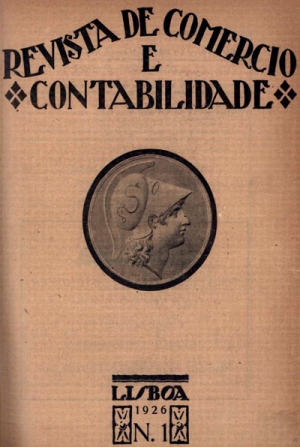
It may seem extraordinary that Pessoa has moved from a magazine like Athena, which came out in 1924 and 1925, and which is one of the high places of Portuguese artistic Modernism, to a magazine like this one, dedicated to the study of the theory and sociology of commerce and clarification of the organizational problems of a commercial office, with special focus on the issue of archives. This magazine will come out in six issues, from January to June 1926, directed by his brother-in-law Francisco Caetano Dias and which Pessoa writes in almost integrally. In fact, this immersion of Pessoa in the general and concrete problems of his profession will end up having consequences, as such a modern dedication to a low artistic cause is not only taken entirely seriously and with all possible depth, but also to, by a sudden alchemy, suggest the creation of an entirely new figure in the heteronymic universe, the singular Bernardo Soares, a "bookkeeper's assistant in the city of Lisbon" who appears shortly afterwards, in 1928-1929, as a "composer" for the Book of Disquiet. And this is also one of the most salient points on which the figure of Pessoa echoes that of Mallarmé, as he also dared to trivialize with his magazine La Dernière Mode.
O Sol, of republican tendencies, reproduced in the same year one of the articles published there, «Organizar». The Information, directed by the monarchist Homem Cristo Filho, also transcribes another of the articles, «Régie Monopoly, Liberty», with the proper bow – it is, moreover, a debate that is taking place in the Chamber of Deputies, and which shakes the nation. Here, it is clear that it is not a pure theory of commerce that interests Pessoa in his contributions to the magazine, nor even a dissemination with strictly professional objectives, for accountants or businessmen, but above all a social intervention. But without leaving speculative flights, as in the article on “The Evolution of Commerce”, in which commerce is compared with culture, industry with art, and the development of argumentation remains in these parallels. And, if an article such as «Calendar Reform and its Commercial Consequences» touches on futility, due to its excessive commitment to circumstantial themes, the article «Practical Precepts in General and Henry Ford's in Particular» touches on central philosophical themes of Pessoa – the essential irrationality of man, for example – and are intended for a strong pedagogical intervention. Some of the themes they point to have a certain originality and percussiveness, especially the article "As Algemas", published in no. 2, on February 25, 1926, which explains the reasons for the social harmfulness of all the prohibitions on free sales of drugs or alcohol, and the reasons for a free circulation of goods from customs constraints.
A curious aspect, and which marks the quasi-heteronymic construction of the «author» of these articles, is the importance given to the organizational issue, and the effort involved in an article with the degree of specialization of «The Correspondence Archive»: how can such an excess of organization, such an obsession with detail, which implies such a preoccupation with method, be compared with – once an office worker has been changed into a poet – the discontinuous stream of fragments that is one’s oeuvre?
Fernando Cabral Martins
Bibl.: ALMEIDA, L. P. Moitinho de, Fernando Pessoa – No Cinquentenário da sua Morte, Coimbra, Coimbra Editora, 1985; FERREIRA, António Mega, Fazer pela Vida, Lisboa Assírio & Alvim, 2005; SOUSA, João Rui de, Fernando Pessoa – Empregado de Escritório, Lisboa, Sitese, 1985.
